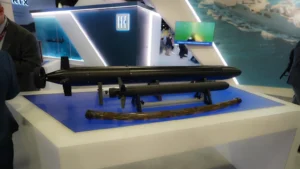Leidos is a US-based technology and engineering services company providing services to the defense, intelligence, civil and health markets. Leidos was founded as a new company in 2013 out of Science Applications International Corporation (SAIC), founded in 1969, which retained the SAIC name and a more limited focus on providing IT services to government clients.
Leidos’ defence services include providing airborne operations, maintenance, intelligence, surveillance support, air and missile defence systems, unmanned vessels, command and control centres, cyberintelligence and support services to F-16 fighter jets produced by General Dynamics. Leidos is expanding its business into AI-driven cyber capabilities.
Headquartered in the defence contractor hub of Reston, Virginia, Leidos’ parent company Leidos Holdings, Inc. posted global revenues of US $16.6 billion in 2024. US entities generated 92% of its revenues, 48% of which was for Leidos’ contracts and subcontracts with the US Department of Defense and US intelligence clients.
Leidos has a workforce of over 47,000 across 400 locations in 30 countries including the UK, Canada, and Australia. In the UK, it counts the Home Office, the Ministry of Defence, and the Metropolitan Police Service among its clients, and its subsidiaries include Leidos Innovations UK Ltd, Leidos Europe Ltd, Leidos Supply Ltd and Leidos Ltd.
Technology and information management platforms
Leidos provides bespoke data management systems for defence and intelligence clients. In 2024, it obtained a US$ 158 million contract to develop and expand the US Air Force’s Command and Control Incident Management Emergency Application and a US$ 143 million contract to develop a tech platform for the Defense Intelligence Agency. In 2023, it obtained a US$ 700 million “technology development support” contract for the US’ GCHQ equivalent, the National Security Agency, and a US$ 32 million defence radar systems development contract for the US Marine Corps. In 2019, Leidos obtained a US$ 72.8 million contract to provide a submarine detection system to the US Navy. In 2018, Leidos was among 10 major companies to receive a portion of the US National Geospatial Agency JANUS ‘mega-contract’. Leidos and partners BAE Systems and Boeing among others would build NGA’s capacity to access near-real time, commercial content including crowd- and community-sourced data for intelligence purposes.
Leidos has several significant contracts with the UK Ministry of Defence. These have included a 2025 seven-year contract to provide meteorological and oceanographic information to support the National Centre for Geospatial Intelligence and a multi-year UK£ 6.7 billion logistics commodities, services and transformation contract awarded in 2015 to support the MoD’s supply chain.
Leidos’ contracts with NATO have included a US$ 87 million contract with its Communications and Information Agency (NCIA) to deliver a centralised IT solution based on private cloud technology in consortium with Thales and Leonardo among others.
Airborne, geospatial and maritime surveillance
Leidos is a significant player in the development of autonomous unmanned vessels. Leidos reports that it led the team that designed and built the US DARPA’s Anti-Submarine Warfare (ASW) Continuous Trail Unmanned Vessel (ACTUV), now named Sea Hunter, capable of operating on the open seas for months at a time.
Leidos was reported by Intelligence Online to be a partner company in the development of the US Coast Guard’s SilentShield acoustic detection model – essentially a maritime surveillance programme to identify and spy on hidden vessels and their communications, a component of the US’ tracking of drug trafficking. Leidos was developing an acoustic database enriched with AI input, capable of distinguishing the typical behaviours of a submerged vessel, such as drift phases, tactical pauses and engine load variations.
In 2024, Intelligence Online reported that Leidos provided underwater drones equipped with infrared cameras and underwater microphones to the US Navy conducting surveillance off the coast of China. Leidos also received a major US Navy Undersea Warfare Systems contract in 2022. In 2024, the Nav awarded Leidos a US$ 248 million contract to design and engineer sea drone tech. In 2025, the US Marine Corps was testing Leidos’ autonomous undersea vehicles such as its ‘Sea Dart’.
In 2022, Leidos acquired Australian company Cobham Aviation Services Australia’s special mission business providing airborne surveillance and border control solutions, and indicated its desire to expand its already strong market in that country.

Controversies
Leidos has attracted relatively little public campaigning action compared to other, better known defence companies. It has however been criticised for its business practices and for providing border surveillance technologies to monitor small boat migrant crossings in the English channel.
In April 2025, researchers from the Universities of Liverpool, York, Sheffield and Nottingham published a report finding that between 2018 and 2018, Leidos would have UK£ 96 million in total to provide biometrics and fingerprinting services. Leidos did not respond to the findings or engage with the Business and Human Rights Centres’ initiative to follow up the researchers’ complaint.
Between 2022 and 2024, Leidos was investigated in the US for alleged violation of the US Foreign and Corrupt Practices Act. Leidos stated in 2023 that a former, now late employee who had been terminated at the outset of the investigation had been indicted on wire fraud in the US. The Department of Justice investigation was closed in 2024 with the Securities and Exchange Commission investigation remains open.
